Sporting Rivalries
Next up in our Sporting Rivalries Series is the Summer Olympics.
The Olympics are the pinnacle of an athletes’ career and the headline act in any sport fan’s calendar. The schedule of an athlete will often revolve around the Olympics, ensuring that the games see the very best sport stars from around the globe competing at their absolute peak. With four years of preparation all boiling down to a single performance, the sporting stakes could not be higher than at the Summer Olympics where rivalries are often intense, sometimes controversial and always compelling. The core of the Olympic values is respect, shining through in many of the rivalries, but not so much in others.
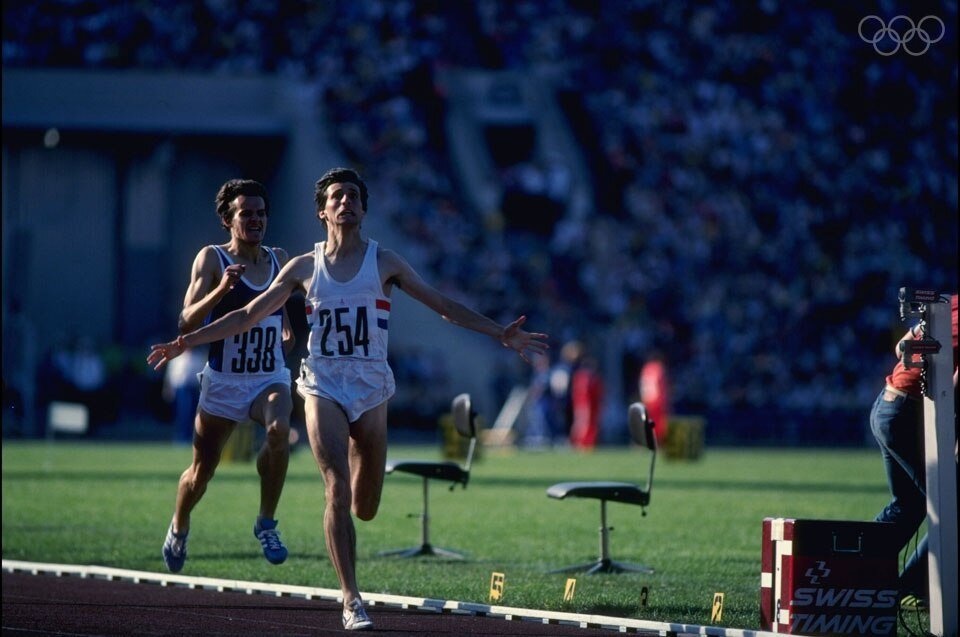 Seb Coe v Steve Ovett (Moscow 1980, Los Angeles 1984)
Seb Coe v Steve Ovett (Moscow 1980, Los Angeles 1984)
Two of the finest track athletes, Seb Coe and Steve Ovett, that Britain has ever produced reached their peak at the exact same time and happened to compete in the same two events.
However, this is where the similarities ended. Coe was the well-educated, well-spoken darling of the British media, whilst Ovett was the working class, media shy, rough diamond. Even their running styles differed.Coe was famed for his graceful late kick, whilst Ovett would nip at the heels of the race leader. Their stark differences meant that British sport fans would support one or the other; they did not cheer for Great Britain - they cheered for Coe or Ovett.
This was a rivalry that saved itself for the Olympic games since, despite the pair enjoying careers that spanned over three decades combined, they only actually raced against each other six times, four of which were in Olympic finals. Although rarely competing against each other in the flesh, there was an ongoing battle of the stopwatches between the pair. In 1980, Coe became a four-time world record holder after adding the 1,000m record to his other world record times, which included the 800m, the mile and 1,500m. But 45 minutes later, at the same meet, Ovett broke Coe’s record in the mile and then equalled his time in the 1,500m a fortnight later. The rivalry was simmering nicely as their hotly anticipated clash at the Moscow Olympics edged even closer.
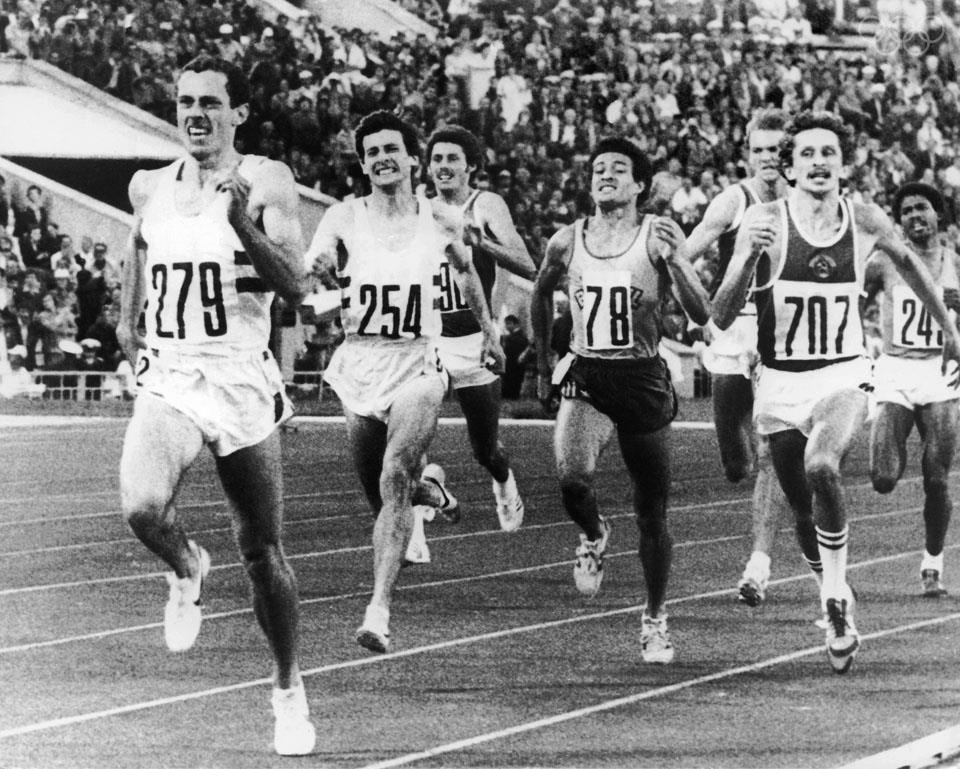 Coe was much fancied for the 800m gold at the 1980 Olympics. However, in an unusually nerve stricken performance, Coe had to produce a last gasp charge just to secure silver, whilst rival Ovett surged down the home straight to take a shock gold. Six days later, Ovett was the favourite to top the podium in the 1,500m, the event he had been undefeated in for three years. This time it was Coe who pulled off an upset when he produced a trademark late kick to take gold, whilst Ovett had to settle for bronze. The Ovett-Coe rivalry was the remarkable talking point of the 1980 Olympic games, with Ovett winning the medal Coe was expected to win, and Coe doing the very same to Ovett six days later.
Coe was much fancied for the 800m gold at the 1980 Olympics. However, in an unusually nerve stricken performance, Coe had to produce a last gasp charge just to secure silver, whilst rival Ovett surged down the home straight to take a shock gold. Six days later, Ovett was the favourite to top the podium in the 1,500m, the event he had been undefeated in for three years. This time it was Coe who pulled off an upset when he produced a trademark late kick to take gold, whilst Ovett had to settle for bronze. The Ovett-Coe rivalry was the remarkable talking point of the 1980 Olympic games, with Ovett winning the medal Coe was expected to win, and Coe doing the very same to Ovett six days later.
The pair did not cross paths again until the 1984 Olympics when in the 800m, it was again silver for Coe, but Ovett, ill with bronchitis finished last. Remarkably, he made it to the final of the 1,500m, but dropped out with 350m left. Coe meanwhile, written off by critics in the buildup to the games, was tearing down the home straight to become the first man in Olympic history to defend the 1,500m title.
This was a fascinating rivalry between two men who were vastly different but brought together by their talent on the track.
Shirley Babashoff v The East German Swimming Team (Montreal 1976)
Athletes tend to have rivalries with fellow individual athletes, whilst teams tend to have rivalries with other teams. It is almost unprecedented for one single individual to have a rivalry with an entire nation but that is just what happened at the 1976 Olympics.
Four years previously, 15-year-old Shirley Babashoff had won two individual silvers and two team golds in the pool. Big things were expected of the US swimmer going into the Montreal Olympics. However, at the 1973 World Championships, the swimmers from East Germany started to post remarkably quick times. It was not just the speed achieved by the East Germans that was notable, but that they did not have the stereotypical build of swimmers. According to Babashoff, they looked more like “wrestlers” and these “wrestlers” had started winning races by five body lengths which would usually have been determined by a fraction of a second. Despite this, Babashoff was still expected to go to Montreal and replicate the performance of US swimmer Mark Spritz at the 1972 Olympics where he won seven golds in the pool. However, it was to be individual silver again and again for Babashoff, as she finished runner up in the 200m, 400m and 800m freestyle with an East German opponent taking the gold on each occasion. Babashoff spoke out against the East German team accusing them of doping, but there was no evidence or any failed drugs tests, and Babashoff was branded a sore loser by the press.
However, after the fall of the Berlin Wall in 1989, leaked documents revealed that the East German government had been systematically feeding steroids to their athletes. Babashoff had been swimming clean against heavily doped opponents, but she is still to be formally awarded the gold medals she was robbed of over 40 years ago.
Although Babashoff never secured an individual Olympic gold medal, she does have three team golds, one of which was won in Montreal. The 1976 women’s 4x100m freestyle relay is considered the greatest race in women’s swimming history: Babashoff swam the anchor leg for the USA team of Kim Peyton, Wendy Boglioli and Jill Sterkel, extraordinarily beating a steroid taking East German quartet, by breaking the world record by four seconds.To have called out the East German dopers was one thing, but to beat them was an incredible feat and a huge victory for sporting integrity.
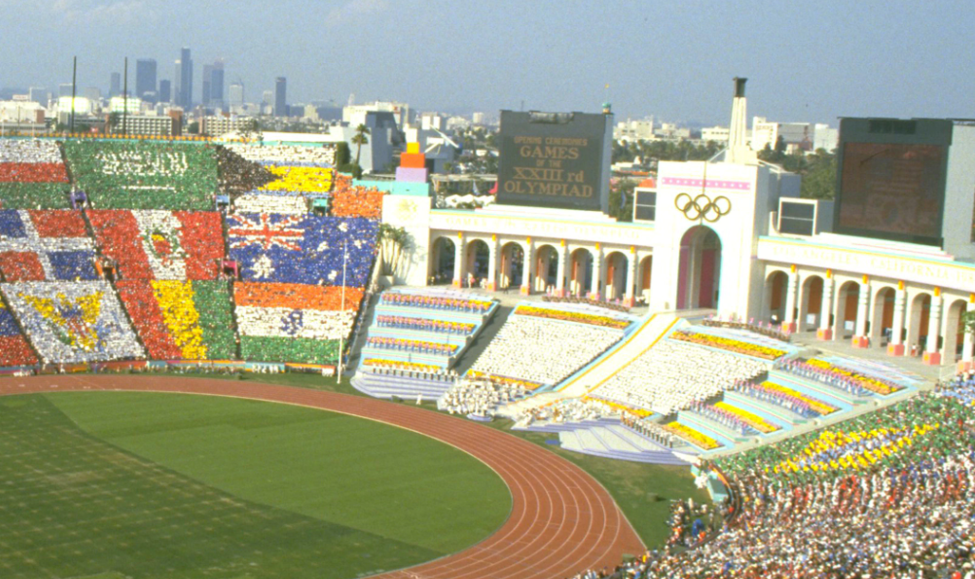 Zola Budd v Mary Decker (Los Angeles 1984)
Zola Budd v Mary Decker (Los Angeles 1984)
The 3,000m at the 1984 Olympics was hyped up by the press as a battle between hot favourite Mary Decker of the USA - a double world champion and holder of six world records - and Zola Budd, an 18-year-old barefoot runner who held the 2,000m world record and an unofficial 5,000m world record, spurred on to run by the loss of her sister. Growing up in South Africa, Budd had idolized Decker, an American national treasure who had caught the nation’s attention when she won an 800m race at a US-Soviet meet aged 14.
However, South Africa were banned from competing at the Olympics due to apartheid, so the Olympics were just a pipe dream for Budd. However, the Daily Mail uncovered the young South African’s extraordinary running times and helped her to gain British citizenship (she had a British grandfather), in exchange for exclusive rights to her life story. This was not a move that political activists took lightly with demonstrators protesting wherever Budd raced.
Decker and Budd were leading the 3000m at the 1984 Olympics, when at the 1,700m mark, Budd attempted to move ahead. Decker tried to stay close and put pressure on her rival, but the pairs’ legs became tangled, and Decker spectacularly fell over the side of the track. The American injured her hip, bringing an end to her race and dreams of Olympic gold when she was carried from the track in tears. Budd maintained her footing and ran on but was so shaken by the incident that she went on to finish in seventh with the American crowd booing her as she ran.
Decker refused a post-race apology from Budd and sobbed in the press conference afterwards, blaming her rival for the fall. Journalists and experts were split on who was at fault for the collision and Budd was initially disqualified, but after reviewing the replays which showed she was not to blame, she was reinstated. The likely conclusion is that both runners were too accustomed to running so far ahead of their opponents in races that they were not used to being in a competitive tight pack and hence the coming together.
A year later, the pair met again in England, shaking hands and making up. Decker has since said Budd was not responsible for the fall, and the pair have made a film together documenting the famous race.
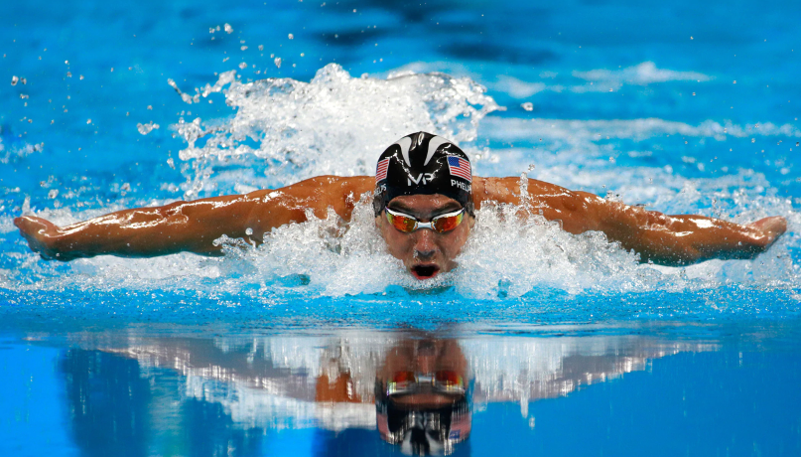 Michael Phelps v Chad le Clos (London 2012, Rio 2016)
Michael Phelps v Chad le Clos (London 2012, Rio 2016)
South African swimmer Chad le Clos burst onto the scene at the London 2012 Olympics in the 200m butterfly. This was a title his hero Michael Phelps had held for eight years and had not been beaten in the event since 2001. However, Phelps misjudged his final stroke, and the South African underdog took gold by 0.05 seconds. Le Clos was in tears on the podium as he collected his first ever Olympic medal and what a way to do it - beating his idol to pull off one of the shocks of the games.
Despite the fierce competition between them in the pool, the pair became good friends but when Phelps came out of retirement in 2015, the trash talk began. It was Phelps who made the first dig when he questioned the times being posted at the 2015 World Championships - a meet that Phelps was absent from. Le Clos bit back after taking gold in the 100m butterfly, pointing out that he had just registered a time faster than Phelps had managed in the last four years. Days later, Phelps beat that time at the US national championships and made more comments about the South African as the rivalry intensified in the buildup to the much-anticipated showdown between the two at the 2016 Rio Olympics.
As predicted, the rivalry raged on in Rio. Whilst waiting to be called out for their 200m butterfly semi-final, Le Clos started shadow boxing in front of Phelps. The American responded with an iconic death stare from underneath his hood, with the image going viral. Both qualified for the final, which was hyped up as a bitter rematch, and this was the race Phelps had had his eye on since coming out of retirement. It was the American who won back his title, taking his 20th Olympic gold medal in the process, whilst le Clos finished in fourth, lamenting his poor performance afterwards. Post-race, Phelps confirmed that winning back the 200m butterfly title had been the main motivation for his comeback.
Le Clos and Phelps met one final time at the 2016 Olympics in the 100m butterfly, and fittingly they finished in an extraordinary three-way tie for silver alongside László Cseh of Hungary (Joseph Schooling from Singapore won the gold medal). A rivalry that had seen them both exchange titles, times and a few choice words, ended with the pair on the exact same step of the podium.
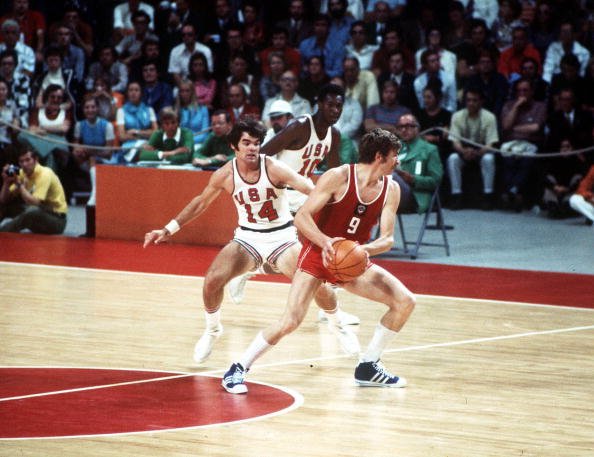 USA v USSR Men’s Basketball (Munich 1972)
USA v USSR Men’s Basketball (Munich 1972)
The USA had dominated basketball since it was introduced to the Olympic Games in 1936 and had won seven consecutive gold medals, with an impeccable 63-0 winning record. In the gold medal match at the 1972 Olympics, they came up against the USSR, the side who had finished as silver medalists at every Olympics between 1952 and 1964 and had taken bronze four years earlier in Mexico City.
With the sporting rivalry between the USA and the USSR reaching an unprecedented high during the Cold War, and with a controversial political edge already gripping the games, the stage was set for an epic showdown. What unfolded was one of the most extraordinary, entertaining and ultimately controversial sporting events in Olympic history: the USSR raced into a 26-21 half time lead, which gradually stretched into a 10-point advantage, but with the USA’s proud Olympic record on the line, the fightback finally began six minutes from time. With only 10 seconds left on the clock, the USSR lead had been reduced to just a single point. Doug Collins charged towards the basket, before he was fouled, painfully crashing to the ground. He returned to his feet bruised and dazed to take the two free throws that the USA had been awarded with just three seconds left. If he scored one, they were level. If he scored two, the USA would go a point ahead and the gold medal was almost certainly theirs. Collins sunk them both and the remarkable comeback appeared completed. The USSR then attempted to take a time out, which they were awarded with one second left. The game finished but there were more interventions from FIBA, the basketball governing body, and a further three seconds were added on. The USSR failed to take advantage of this as their attempted long throw was wayward, the buzzer sounded, and the USA team were sent into delirium; a mixture of joy and relief at salvaging the gold medal from the jaws of defeat.
However, as the Americans were celebrating on the court, swamped by fans who had run on from the stands, the clock was being reset again, with another three seconds added on and FIBA demanding that they be played out. The court was cleared, and the USSR brought on long throw specialist Ivan Edeshko, whose huge pass found Alexander Belov. The USSR player shrugged off the USA defense and sunk a lay-up. The buzzer sounded, Belov charged up the court in celebration and the USSR became Olympic champions.
The USA were outraged, but their protests were ignored, and so for the first time in Olympic history, a place on the podium was left empty. To this day, their silver medals remain uncollected in a Swiss vault.
Not Forgetting…
Munich 1972 was not the first time politics and sport collided at the Olympics. At the 1956 Melbourne games, defending water polo gold medalists Hungary met the USSR in the semi-finals when, at the time, the latter governed the former. The Hungarian revolution had begun two months prior to the games, so tensions were high between the two nations and an ill-tempered match finished 4-0 to Hungary, but is famed for what happened with two minutes left to play. One of the USSR’s star players, Valentin Prokopov, rose out of the water and punched Hungary’s Ervin Zádor. Blood poured from Zador’s cheek as fans rose up in anger and the police had to intervene. Hungary went on to win gold, but Zádor was forced to sit out the game because of the injury sustained - the game is famously coined the “Blood in the Water Match”.
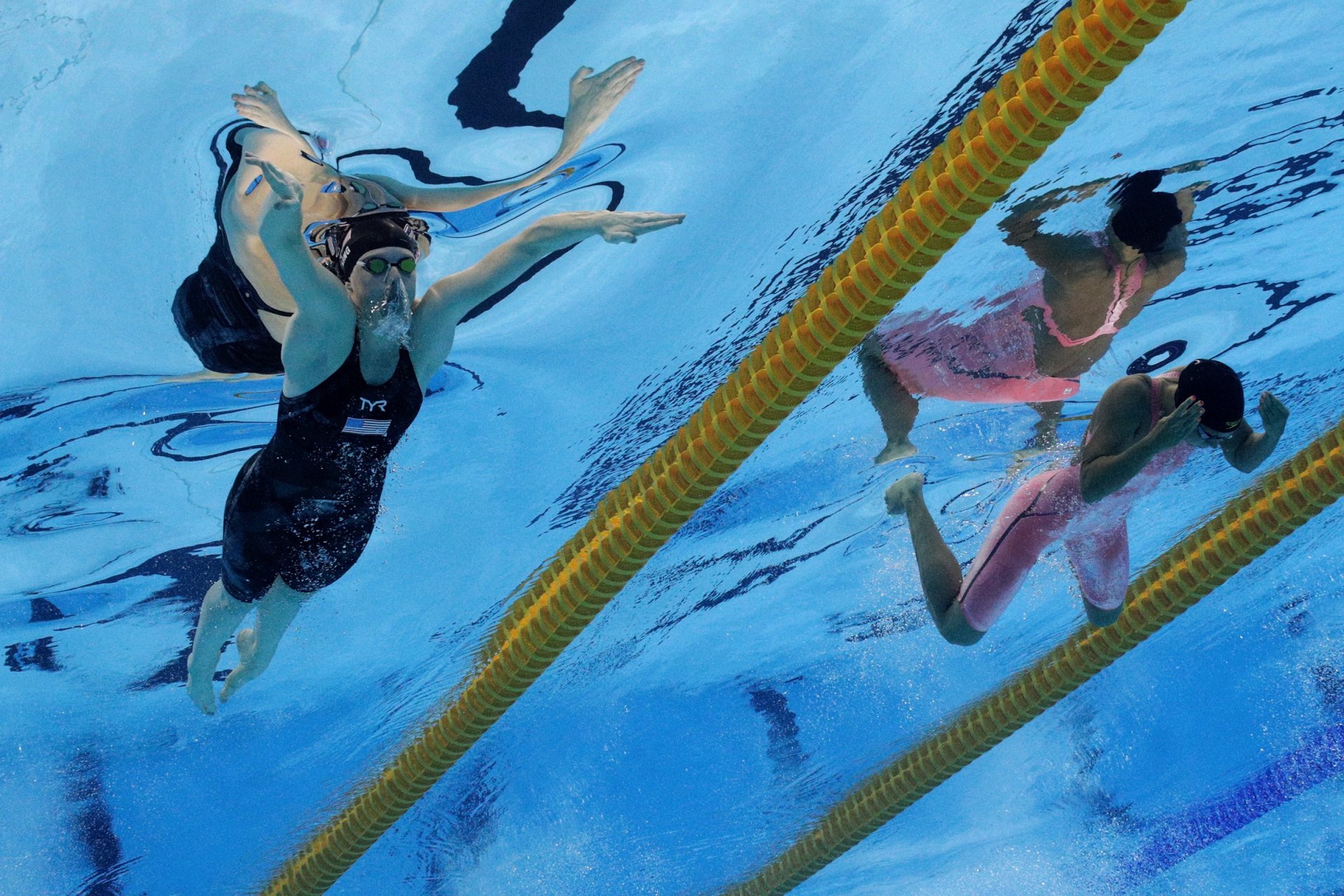 A more recent rivalry seaped in controversy is the one between swimmers Lilly King and Yulia Efimova. The two breaststrokers faced off at Rio 2016, with American King taking gold in a world record time. She questioned second place Efimova’s right to compete, after the Russian had been banned twice for failing drugs tests. Efimova was close to tears in a post-race press conference, calling her failed drugs tests past mistakes.
A more recent rivalry seaped in controversy is the one between swimmers Lilly King and Yulia Efimova. The two breaststrokers faced off at Rio 2016, with American King taking gold in a world record time. She questioned second place Efimova’s right to compete, after the Russian had been banned twice for failing drugs tests. Efimova was close to tears in a post-race press conference, calling her failed drugs tests past mistakes.
Elsewhere in the pool, American swimmer Gary Hall Jr, famed for his colourful personality, had a fierce rivalry with Russian Alexander Popov, one of the all-time greatest sprint swimmers and is well known for a war of words in the press at the 1996 Atlanta Olympics. Not content with taking on just one individual athlete, Hall began a rivalry with the entire Australian swimming team at the Sydney Games in 2000. In a blog post, Hall wrote that the USA relay team were going to smash the Australians “like guitars”. Australian swimmer Ian Thorpe beat Hall in the final leg of the 4x100m freestyle relay and celebrated by playing air guitar. However, Hall graciously was the first person to congratulate the Aussie team on their gold medal. This epitomises a long running swimming rivalry between America and Australia, two of the world’s biggest powerhouses in the pool.
China and the USA had a gripping rivalry in the 2008 women’s gymnastics team final. The two teams were almost inseparable in score on each apparatus, with China eventually triumphing and taking gold with a total score of 188.900 points (driven by their outstanding score on the floor exercise), and USA narrowly missing out on topping the podium with a final score of 186.525 points. China and the USA enjoy a huge rivalry at Summer Olympics, with the two nations battling it out at the top of the medal table. This competitive exchange was particularly high during 2008, with China desperate to top the medal table at a home Olympic Games. Outstandingly, they did succeed in finishing at the summit of the medal table, winning 48 golds compared to the USA’s 36.
Australian cyclist Anna Meares has enjoyed a career long rivalry with the British cycling great - Victoria Pendleton. The British rider triumphed in the 2008 sprint final, before surging to victory for gold in the Keirin at London 2012. Meares won the final meeting between the pair in the sprint final in London, with Pendleton’s first round victory controversially chalked off. The pair were similar in the way they were driven by sheer grit and determination, overcoming mental health struggles en route to glory, and allowing their rivalry to push each other to be better. Australia versus Britain is a huge rivalry in track cycling in general, with the two nations meeting in multiple finals and trading world records during recent Olympic games.
Which Olympic rivalries will emerge at the next summer Olympics in Tokyo? Check out the Fixture Calendar for the Olympic dates, and all the other sporting schedules from across the globe.
Written in December 2019
Photos by Olympics